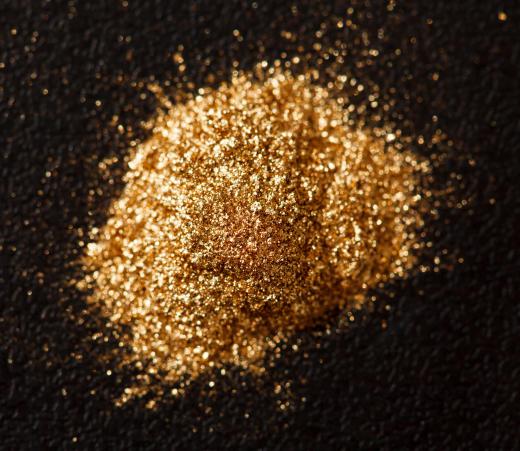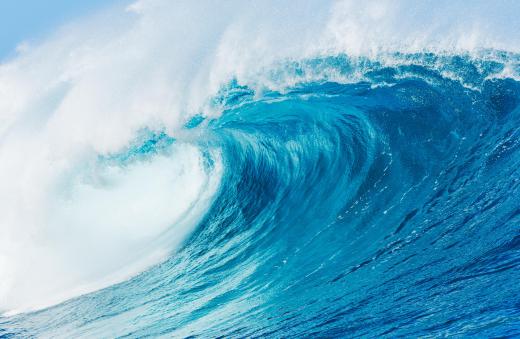Can Gold be Extracted from Seawater?
 Michael Anissimov
Michael Anissimov
Yes, it is possible to extract gold from seawater in theory, but it's really not practical to do so. It is estimated that there is, in total, about eight million tons of gold dissolved in the world’s oceans. While this is a lot, the oceans are huge, and the actual concentration of gold in seawater is only about 0.0000000006%. To put it another way, there is between 0.1 and 2.0 mg per ton, depending on location, making it uneconomical to extract using any current technology.
The Sea as a Source of Minerals

Since the sea is fed by rivers that flow over land containing metals, minerals and ores, a great variety of these can be found in seawater in the form of soluble compounds. This is added to by material from hydrothermal vents — fractures in geologically active areas of the ocean floor through which hot, mineral-rich water flows into the ocean. The concentration of different elements in the oceans depends not only on their abundance in the Earth’s rocks, but in their reactivity and solubility.

By far the most common metals in seawater are sodium, magnesium, calcium and potassium, in that order. These are all very common, in combined form, in the Earth’s crust, and they can form a variety of compounds that are very soluble in water. Gold, aside from being a rare element, is also very unreactive, and does not easily form compounds that can find their way into the ocean by dissolving in water. For these reasons, the concentration of this metal in seawater is extremely low.
History

Gold was first detected in seawater in 1872 by the British chemist S. Sonstadt, and ever since, a number of people have promoted the idea of extracting the precious metal from the oceans. One of the most notable was the German chemist Fritz Haber, co-inventor of the Haber-Bosch process, who spent a portion of his career attempting to devise a practical method of obtaining the metal from seawater to pay for Germany’s post-World War I debt. When it became clear just how low the concentration of gold actually was, he abandoned his efforts. Despite a number of hoaxes and scams, serious interest in the subject continues, as reserves of gold on the Earth’s surface diminish.
Extraction
Due to the extreme dilution of gold in seawater, there is currently no economically viable method of obtaining the metal from this source. Vast amounts of seawater would have to be evaporated to concentrate it sufficiently to allow it to be recovered by any conventional process. This in itself would require a lot of energy, with more power and raw materials being consumed in the actual extraction process. The cost would amount to far more than the value of the gold obtained.
The only elements that are currently produced commercially from seawater are the non-metals chlorine and bromine. In the latter case, most is obtained from more concentrated non-marine brine deposits, but some is produced in Israel from the very salty waters of the Dead Sea. The concentrations of these elements in seawater are, however, enormously greater than that of gold.
In the past, iodine has been obtained indirectly from the sea by processing seaweed, which concentrates the element. A similar form of biological extraction could conceivably form the basis of a future means of gold production. Although seaweed does not concentrate the metal, some other organisms, such as certain types of bacteria, may do so. It is therefore just possible that organisms of some sort, either natural or genetically engineered, could be used to recover gold from the sea, but this is highly speculative and may never become viable.
AS FEATURED ON:
AS FEATURED ON:













Discussion Comments
On a recent investment show on TV, a man proposed the same thing -- gold from seawater -- and he was laughed off the stage. He said he had invented a machine that separated the gold from water.
Now, think of the TV show about the Bering Sea Gold where they use suction dredges to remove gold flakes and nuggets from the bottom of the ocean in Alaska currently. It makes more sense to do that than trying to remove gold from seawater. However, one needs to read about going to Alaska and the harsh conditions you will face and the enormous cost of trying it if you have little or no knowledge what you are getting yourself into.
Read about the articles from the Coast Guard requirements and city of Nome, Alaska along with Division of Mining, Land and Water at the state Department of Natural Resources.
I really like you all, and glad you have this idea. Problem: The stats on the amount of gold in the oceans here are incorrect. There is more.
Extracting the gold from most anything is not the problem. (Even in the rare forms that do not even appear to be gold because of the molecular structure and its encapsulation) Finding the gold is. You all seem olde, and intelligent. You know you have gold and want to extract it? There are online video sites. It may take you watching 200 videos, but somewhere there, you will see and understand the method you need. If you don't find it, you did not look hard enough. Period.
Next, we all know the gold is in the seawater, correct? It's the PPT (Parts per Trillion) and processing that vast amount of water that makes it seem less than lucrative. Right?
Here is where people lose faith. They think about the fuel costs, to not only run the boat, but extract the gold etc., etc., etc.
There are many ways, but lets keep it simple. Do any of you know about electroplating gold? Covering a metal object like stainless steel with gold? Well, once you understand how to get gold to "collect" to an object, all you need are a few things. I won't tell you everything; you should know this already,
But you need gold, and to process a lot of water. Of course. And we all know where that is: the ocean. So now, how do you cut expenses to process that much water? Three hints: wind, hydro and solar. All three can be used for free to run the massive amount of water needed through your system to collect the gold (Worry about getting the gold off of your metal plate later; it is not expensive to do)
Not sure how else to say this without just telling you! And if you do not already understand, you did not work hard enough to deserve the answer in the first place.
I've told you enough. The last part is sail for a month. After you have 10 ounces of gold, you just made $13,000 American dollars at the price today, for sailing! If you make more than that to sail on the free wind enjoying the ocean, then cheers!
I hope at least one of you understands. Happy hunting!
Can a centrifuge be use to separate all mineral deposits from seawater, including gold?
After which conventional methods could then be used to harvest the usable minerals and gold that were gravity separated from the seawater. Is this possible?
Are there legal ramifications of extracting gold from seawater? Does it require permission or licensing from authorities?
@anon278951-- T-6 is a chemical solution that people use to leach gold and other metals. I think it's just sodium polythiocarbonate.
Lots of people seem to be using it but it seems kind of dangerous to use. It certainly requires experience with chemicals and leaching. It's also quite expensive. But it's a good way to take out metals from liquids, especially for smaller amounts. That's why it's used for extracting gold from seawater.
I don't think large industries use this chemical though. I think they use cyanide because they're dealing with larger amounts of metals.
I'm sure people here who have used T-6 can give you more detailed information on it.
This is a great idea but I'm not sure if it's worth doing. Seawater is too vast and the gold in it is too dispersed. I'm not sure if it's worth the immense effort required to extract it. Probably not.
I have heard however that the same method is used with groundwater located near gold jewelry-making facilities. Apparently, while jewelry-makers are melting and working with gold, a lot of it ends up going down the drain and entering sewers or groundwater. So people have started filtering the tiny gold particles in this water. They obtain a lot of gold this way.
Please post where I can read more about T6. What is it?
With the current price of gold, you may be starting a salt rush! Do salt producers strip the gold out? Or do they even know about the process?
I currently live in Cheshire Uk where we have large numbers of salt and brine beds. I read with interest all your comments but have no idea of the process (hard working builder by trade). where can i find further knowledge? any help please?
I've been working with T6 also but can't seem to get the pm's from the T6 precipitates. The silver just flows through during firing and doesn't catch anything. Precipitates just turn into a glass.
Do any of you chemically leach the precipitates instead of directly firing?
The vents and sea water at the bottom could hold more gold? Could gold be held more under pressure near the bottom of the oceans in sea water?
I am currently working with T-6 to leach gold
from salt. I would like to discuss this with
anon85771 and emr1 if possible. Just looking for knowledge and answers. Thanks, Steve
Likewise! I've worked on this process for three years now and have also succeeded in extracting up to eight grams of gold from a 50 lb bag of Utah salt. The Mexicans also had gold but not nearly as much. PPM equates to grams/ton. Like you, I'll keep the process in my head. -Sluiceman
How are you?
We are presently recovering gold from to different kinds of salt, one of the salts is sea salt from mexico, it is dried sea salt, the other is from Utah.
Gold is in these materials is a hidden structure, it must forced out. We are testing other salt from over seas that have ppm of platinum group metals.
I think your web site is great, keep up the good work. Best regards. David
Post your comments